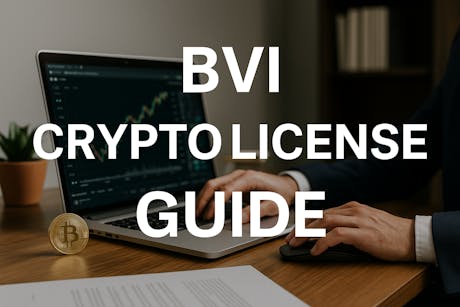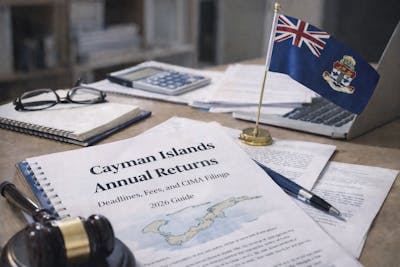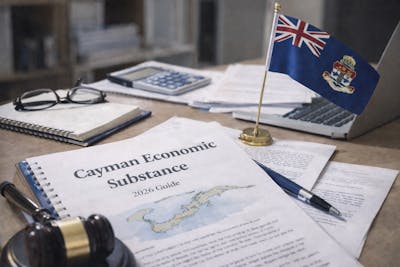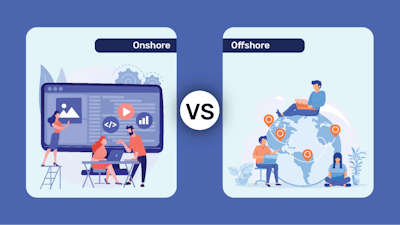There is no single “crypto license.” Activities are regulated under existing laws, chiefly the Virtual Assets Service Providers Act, 2022 (VASP Act) and Securities and Investment Business Act, 2010 (SIBA).
BVI offers no corporate income tax and no capital gains tax, and is widely used for tax-neutral structuring.
VASP registration is required for exchanges, custodians, and other covered services, with defined application and registration fees and clear processing standards. Penalties apply for non-compliance.
The British Virgin Islands (BVI) continues to attract crypto and fintech projects thanks to its predictable common law courts, depth of professional service providers, and tax-neutral regime. Investors and entrepreneurs also value the jurisdiction’s regulatory clarity for virtual assets, which provides certainty in structuring and compliance.
The Virtual Assets Service Providers Act (VASP Act) came into force on 1 February 2023. A transitional period allowed existing operators to adjust until 31 July 2023, after which all entities engaged in covered activities must be registered as VASPs to operate legally in the BVI.
Crypto Regulations in the British Virgin Islands
On July 10, 2020, the BVI Financial Services Commission (FSC) announced that rules for crypto-related businesses would be handled under the country’s current financial laws.
This means that any company wanting to run a cryptocurrency exchange or offer crypto lending must check if their business activities fit under current laws. They need to make sure they are following the right rules. Some of the key laws include:
Virtual Assets Service Providers Act, 2022 (VASP Act)
The core regime requires registration of virtual asset service providers, including custody, exchanges, and other covered activities.
Securities and Investment Business Act, 2010 (SIBA)
Applies to crypto products that function as investments, such as tokenized securities or crypto funds.
Financing and Money Services Act, 2009 (FMSA)
Regulates fiat money services. Where a firm is registered only under the VASP Act, certain FMSA provisions do not apply to virtual asset activities.
Anti-Money Laundering Regulations, 2008 and Anti-Money Laundering and Terrorist Financing Code of Practice
Establish AML/CTF duties for virtual asset services, including specific thresholds for crypto transactions.
Financial Services Commission Act, 2001 (FSCA)
Creates the BVI FSC and sets out its supervisory and enforcement powers.
A token issuance alone is generally not regulated under the VASP Act, unless it is combined with a regulated virtual asset service conducted for or on behalf of others.
Here’s the link to “BVI FSC Guidance on Application for Registration of a Virtual Assets Service Provider” for further reading.
Do You Need VASP Registration?
Under the VASP Act, you must register with the FSC if you carry on, in, or from the BVI, any of the following virtual asset services on behalf of another person:
- Operating a virtual assets exchange
- Providing virtual asset custody services
- Transferring virtual assets or offering other covered services under the Act
When reviewing an application, the FSC considers:
- Governance arrangements
- Fit-and-proper status of directors and senior officers
- Risk management policies
- Financial resources and capital adequacy
- Cybersecurity measures
The VASP Act requires at least two individual directors. In practice, most entities must also appoint an authorised representative in the BVI to maintain compliance.
What Crypto Activities Are Allowed in the BVI?
The BVI permits a wide range of crypto and digital asset activities, provided they are registered under the VASP Act or otherwise approved by the BVI FSC.
Activities Allowed (With Registration or Approval)
- Centralized exchanges
- Custodial wallet providers
- Broker-dealer style intermediation of virtual assets
- Initial Coin Offerings (ICOs) / Security Token Offerings (STOs) where a regulated service is also provided
- DeFi (Decentralized Finance) pilots through the Regulatory Sandbox
- Stablecoin projects or crypto payment solutions that meet statutory definitions
- NFT marketplaces offering trading or custody functions
For emerging or experimental business models, applicants can apply to the BVI Regulatory Sandbox, which allows testing under a controlled, time-limited environment.
VASP Fees in the BVI (Official FSC Schedule)
The BVI FSC sets out prescribed fees for VASPs under the VASP Act. These include application fees, initial registration, and annual renewal charges.
| Item | Fee (US$) |
|---|---|
| Application – standard VASP | 5,000 |
| Application – custody VASP | 10,000 |
| Application – exchange VASP | 10,000 |
| Initial registration – standard VASP | 7,500 |
| Annual renewal – standard VASP | 7,500 |
| Initial registration – custody VASP | 15,000 |
| Annual renewal – custody VASP | 15,000 |
| Initial registration – exchange VASP | 25,000 |
| Annual renewal – exchange VASP | 25,000 |
Source: Financial Services (Fees) Amendment Regulations, 2023.
How Long Does BVI VASP Registration Take?
According to the BVI FSC, the typical VASP registration timeline depends on the quality and complexity of the application:
- Initial review: Expect comments from the FSC within around six weeks of submitting a complete filing.
- Final decision: Most applications are concluded within about six months, depending on the applicant’s responsiveness and the complexity of the business model.
- Additional reviews: Extra time should be built in for fit-and-proper checks on directors and senior officers, as well as policy and risk management reviews.
Preparing complete documentation and responding quickly to FSC queries can significantly shorten the approval process.
Step-by-Step Guide to Starting a Crypto Business in the BVI
1. Choose Your BVI Company Type
Most entrepreneurs form a BVI Business Company (BC) because it allows 100% foreign ownership, flexible share structures, and bank-friendly corporate documents.
2. Incorporate Through a Licensed Registered Agent
Work with a licensed BVI-registered agent to complete incorporation. Standard KYC (Know Your Customer) checks and onboarding apply for all shareholders and directors. Incorporation is typically completed in just a few business days once documents are provided.
3. Assemble Compliance Documents
Prepare the required compliance policies and governance framework, including:
- Business Plan
- AML/CTF (Anti-Money Laundering / Counter-Terrorist Financing) policies
- Risk Assessment
- Cybersecurity Policy
- Governance Charter
- Appointment of a Compliance Officer and Money Laundering Reporting Officer (MLRO) in line with the BVI Code of Practice
4. File Your VASP Application
Submit your VASP application with the FSC, including:
- Approved forms and corporate documents
- Compliance policies
- Key-person details
- Applicable application fee
Respond quickly to FSC queries to stay within the published service standards.
5. Obtain Registration and Go Live
Once approved, the entity receives a certificate of registration. The VASP must comply with:
- Any conditions imposed by the FSC
- Ongoing reporting duties
- Possible audits
- Annual renewal fees
AML, KYC, and Reporting Rules for BVI Crypto Firms
The Anti-Money Laundering Regulations, 2008, and the Anti-Money Laundering and Terrorist Financing Code of Practice apply directly to VASPs in the British Virgin Islands.
Key Compliance Requirements
- Customer due diligence (CDD) is required for all virtual asset transactions of US$1,000 or more.
- Maintain documented risk assessments, conduct ongoing monitoring, and file suspicious activity reports (SARs) when needed.
- Implement the Travel Rule, ensuring originator and beneficiary information is included in applicable transfers.
- These obligations were formally extended to virtual assets in 2022.
Ongoing Compliance After Launch
Financial Annual Return
Most BVI companies must submit a Financial Annual Return to their registered agent within 9 months of the financial year end.
Late filing penalties commonly start at US$300 for the first month, then US$200 per additional month up to US$5,000, and can lead to strike-off.
Director Names
The registry can provide the names of current directors upon US$75 fee payment. Keep your register of directors current.
Authorized Representative and Local Presence
Maintain an authorised representative if required and keep FSC-approved policies, systems, and controls current.
BVI Tax and Substance Rules for Crypto Companies
The BVI does not levy corporate income tax or capital gains tax.
Payroll tax and stamp duty apply only in limited situations.
Companies must still consider home-country tax rules, plus international reporting obligations under the Common Reporting Standard (CRS) and the Foreign Account Tax Compliance Act (FATCA).
Need help with your filing? Air Corporate can form your BVI Business Company, draft a full compliance policy suite, and manage your VASP application filing so you can launch faster and stay compliant!
FAQs
The timeline to obtain registration as a Virtual Assets Service Provider (VASP) in the British Virgin Islands (BVI) typically ranges from 4 to 6 months. The duration depends on the completeness of your application, the complexity of your business model, and the responsiveness of the BVI Financial Services Commission (FSC).
You must register under the VASP Act or obtain approval under SIBA (Securities and Investment Business Act) if you:
- Operate a centralized or decentralized exchange that meets the Act’s exchange definitions
- Provide custodial services
- Transfer virtual assets on behalf of clients
- Run brokerage services for third parties
- Manage crypto investment products classified as securities under SIBA
You may not need registration if you:
- Only develop software
- Operate a non-custodial protocol
- Manage only your own assets
Always confirm on a case-by-case basis with your registered agent or legal advisor.
Operating without approval, failing to meet key obligations, or breaching restrictions can lead to:
- Fines of up to US$100,000
- Imprisonment up to 5 years
- Regulatory enforcement by the BVI Financial Services Commission (FSC)
Most BVI crypto companies open bank accounts outside the BVI, as local banks have a limited appetite for onboarding digital asset clients.
It is not mandatory to hold an account in the BVI. Instead, businesses typically use international banks or licensed payment institutions that are familiar with the sector.
The banking location often follows where your clients, investors, or management team are based.






